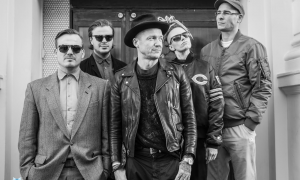Home » Jazz Articles » Live Review » The TAO Saxophone Quartet on Tour
The TAO Saxophone Quartet on Tour
UNIS Theatre / Bowery Wine Company / Zebulon's
New York, NY
April, 2011
After an absence of eight years—last appearing in the USA at the legendary Knitting Factory in 2002—the TAO Saxophone Quartet returned to New York. Formed in 1991 by reedman Noël Pelhate—a devoted fan of composer/saxophonist Steve Lacy—in Besançon , eastern France, the quartet's format has changed since alto/soprano saxophonist Jean-Luc Salgues' sudden passing in June, 2009. Three saxophones—Jean-Philippe Danjou (alto) and Gilles Michaud-Bonnet (baritone) joining Pelhate (tenor)—combined with young percussionist, Etienne Demange to create a rather unusual quartet configuration.
This American tour (April 2010) was the quartet's third. It consisted of several concerts in three very different venues: rather formal at the UNIS Theater (United Nations International School); openly casual at the Bowery Wine Company; and warmly intimate at the popular Zebulon in Brooklyn's Williamsburg.
The sum of it all—changes to the group's composition and the diversity of the three concerts' contexts—unequivocally demonstrated that the TAO Saxophone Quartet remains faithful to its name and TAOist principle of order and unity, specifically the "equilibrium that comes from breath's emptiness" (Lao Tzu).
The broad variety of tunes—from Dollar Brand and John Coltrane via Rabih Abou-Khalil, to original compositions—and the absence of a standard piano/bass rhythm section launched the four intrepid musicians into colorful soundscapes and greatly textured atmospheres, revealing a deep understanding of each other in a sustained blending of their past and present musical paths. From the very first introductory note at UNIS, it was possible to sense the high bar placed by each musician. Like a crescendo, what was launched gently at UNIS gathered strong momentum, as the quartet's final gig at Zebulon brought out the powerful spiritual energy that drives both its music and its members' companionship—deeply felt by the fortunate patrons in attendance. It was a performance of impressive creative vibes, to which the attentive audience could not possibly have remained insensitive.
Over the course of its three concerts, the TAO Saxophone Quartet delivered a very original sound, structured with great precision while remaining highly intuitive, full of subtle nuances and luminous timbres—totally in tune with all the principles of the TAO philosophy. As a piano-less saxophone group, comparisons to the ROVA quartet were a temptation, but TAO's approach and sound were definitely its own. Intensely attentive to the fundamentals of the human soul's invisible exchanges, the four accomplices—each with his own very personal style—highlighted the essence of the four elements: water (in the fluidity of the alto), fire (in the tenor's incandescence), earth (in the baritone's telluric anchorage) and air (in the percussions' atmospheric moves and lightness). This smartly balanced combination resulted in highly harmonious and poetic performances.
From this perspective, is it still possible to speak of complicity? Instead, wouldn't it be more like a deep inner connection, a de facto communion of four souls that simply are? Yes, the TAO Saxophone Quartet chose its name wisely.
Tags
The TAO Saxophone Quartet
Live Reviews
Gilles Laheurte
Steve Lacy
Dollar Brand
John Coltrane
Rabih Abou-Khalil
PREVIOUS / NEXT
Support All About Jazz
 All About Jazz has been a pillar of jazz since 1995, championing it as an art form and, more importantly, supporting the musicians who make it. Our enduring commitment has made "AAJ" one of the most culturally important websites of its kind, read by hundreds of thousands of fans, musicians and industry figures every month.
All About Jazz has been a pillar of jazz since 1995, championing it as an art form and, more importantly, supporting the musicians who make it. Our enduring commitment has made "AAJ" one of the most culturally important websites of its kind, read by hundreds of thousands of fans, musicians and industry figures every month.























